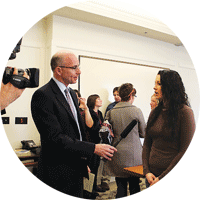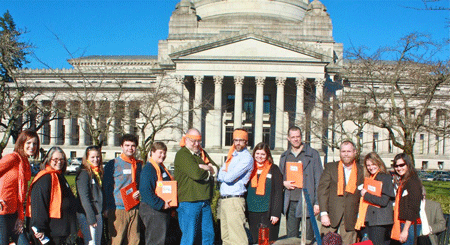Although I have been a Statewide Poverty Action Network member for many years, I had yet to experience one of the most fun and important events they hold every year: the annual Lobby Day at the Washington State Capitol in Olympia. Traditionally held on MLK Day as a day of service, this year’s originally scheduled event was cancelled due to the Puget Sound area’s Snowpocalypse 2012 – so Poverty Action rescheduled for Presidents’ Day.

New and longtime Poverty Action members come together to help "Save Our Safety Net"
Lobby Day is an inspiring combination of community mobilization, education/awareness about the most pressing legislative issues currently affecting people living on low incomes in WashingtonState, and group action. As event photographer (see slideshow below), I got to experience the day in solidarity with people who had some truly moving stories to share – and I participated alongside them as we made our voices heard with our legislators.
Building momentum, setting the stage
The day started with a gathering at the Women’s Club of Olympia. The room was packed with both longtime and new Poverty Action members. Poverty Action is guided by a Board comprised mostly of people living on low incomes from around Washington State. Board member Ligia Velázquez of Lynnwood and Board Chair David Northover of the Yakama Nation co-MCed the morning’s events, which gave us all a wealth of information from Poverty Action staff and members. Ligia seamlessly interpreted in Spanish as needed to keep the large number of Spanish-speaking attendees in the loop.
Executive Director Marcy Bowers fired us up first thing with her State of the Movement Address, giving us a sense of the power of our collective voice. Then Legislative Coordinator Kate Baber gave a “Save Our Safety Net” Briefing, providing background info to help us understand the importance of saving TANF (Temporary Assistance for Needy Families) and DL (Disability Lifeline) benefits.
To put a human face to how people who rely on TANF and DL will be impacted if funding for these vital programs is not restored, member Adrienne Karls graciously shared her personal story. A former medical worker who made a decent living, she lost everything to hospital bills following a bad car accident. Disability Lifeline was truly the lifeline that pulled her out of homelessness and helped her regain her dignity. She brought home the reality that any of us might someday need that safety net intact.
Throughout the morning, other individual members’ stories grounded our purpose. One young single mom described how she had to give up her job when she had a child, because after paying for childcare, she couldn’t afford rent. Thanks to TANF, she has been able to support herself and her daughter and is two months away from completing her AA degree, which will help her qualify for a living wage job.
Community Organizer Senait Brown also gave us a Racial Equity Briefing, describing how the proposed TANF/DL cuts disproportionately affect people of color. One Latina member, who had organized a large group of family and friends to attend Lobby Day, stood up and shared how people in her community are suffering from the TANF/DL cuts as well.
Finally, a performance by member James King gave everyone a chance to sit back and absorb the meaning of this information. James read an essay in honor of Dr. Martin Luther King, Jr. (which he had originally prepared to read on MLK Day) and then led us all in an a cappella rendition of Bob Marley’s “Redemption Song.”

Members Peter Zimmerman & Adrienne Karls in front of the Capitol building
Lobbying 101
Next came the beginning of the real action: We broke into groups by our legislative districts, and Campaign Manager Danielle Friedman gave us a quick and dirty training on lobbying. The Spanish-speaking members caucused as well. We shared our personal stories (or those of people we care about) around the importance of saving our safety net, and we crafted talking points to bring up when we met with lawmakers’ legislative aides. We also wrote heartfelt letters and postcards to lawmakers, to be hand delivered later.
Fueled by members’ inspiring stories (and lunch), we marched en masse toward the Capitol in our purple “Save Our Safety Net” T-shirts, stopping for a rally at Trivoli Fountain. Our numbers grew as coalition partner groups joined us from all directions, carrying banners and signs reflecting our shared priorities. Undaunted by the misty rain and soggy grass, Poverty Action members and partners danced and chanted and connected in solidarity, pumping each other up for meeting with our lawmakers.
Taking action!
The day’s events culminated in an additional short march to the sundial across from the Capitol building, and then legislative district teams set off to drop off letters and postcards at our lawmakers’ offices. Many of us had the chance to deliver our messages directly, using the power of speech and conviction, via face-to-face meetings with legislative aides.
Even though I’m very familiar with Poverty Action’s work, the impact of what they do really hit home when I met some of their newest members. One guy who had been brought to the events by a friend confessed to me in the morning that previously, he had no interest in politics. He honestly believed it wouldn’t make a difference if he voted, and despite salt and pepper hair giving away his years, he had never even registered to vote. By the end of this Lobby Day 2012, he had led chants while marching, written letters to his lawmakers, talked with a legislative aide, signed up to be a Poverty Action member – and was scrambling to find out how to register to vote as soon as possible.
Now THAT’S showing people their voices matter. That’s Poverty Action IN ACTION.
This slideshow requires JavaScript.
The Statewide Poverty Action Network is part of Solid Ground’s Advocacy Department. Poverty Action builds grassroots power to end causes of poverty and create opportunities for everyone to prosper. They envision a state where people of all income levels fully promote and participate in building the fabric of socially, politically, and economically just communities. For more info and to get involved, visit www.povertyaction.org.
Filed under: Political Action | Tagged: advocacy, social justice, state legislature, Statewide Poverty Action Network, wa state legislature | Leave a comment »



















 It is irresponsible to continue to cut programs our communities depend on while Wall Street Banks profit from unfair tax breaks. In Washington State, nearly 890,000 people now live below the federal poverty line. We need to get our priorities straight: End unfair tax breaks to fund essential services and create jobs.
It is irresponsible to continue to cut programs our communities depend on while Wall Street Banks profit from unfair tax breaks. In Washington State, nearly 890,000 people now live below the federal poverty line. We need to get our priorities straight: End unfair tax breaks to fund essential services and create jobs. 




